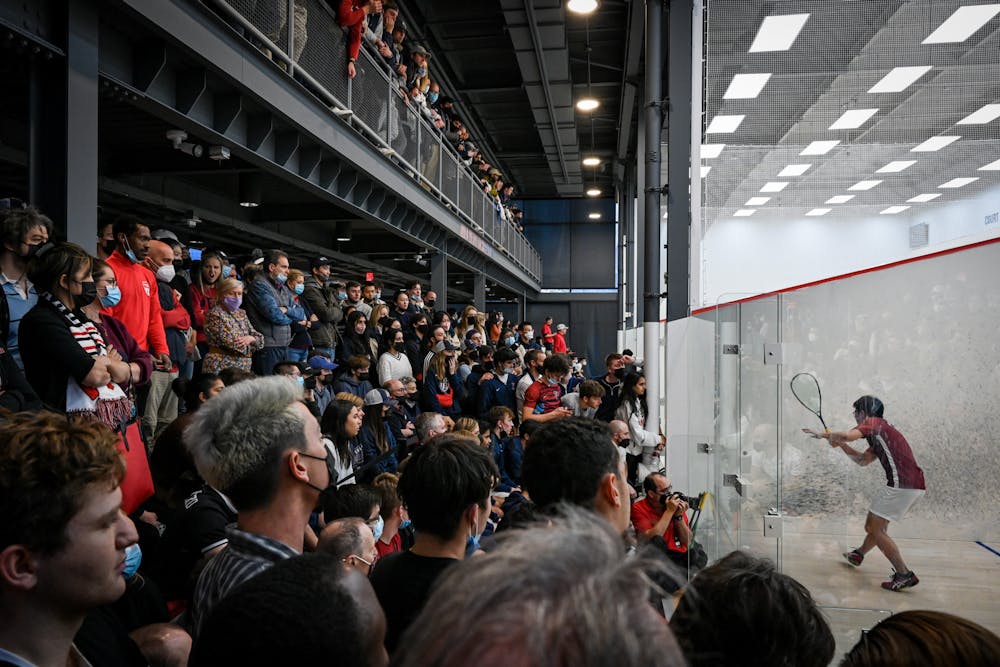For squash players across the world, dreams became reality last month when squash was confirmed to make its Olympic debut in 2028.
“It was something that [players] longed for,” women’s squash freshman Franka Vidovic said. “It was our main goal for the past, I'd say, 10 years. It felt like it wasn't going to happen very soon so once we found out, the entire squash community was very, very happy. It’s something that is going to change the way we approach training and how the sport is going to progress in future years.”
Squash is one of five sports being added by the International Olympic Committee to the 2028 Los Angeles Games, along with flag football, and the return of baseball-softball, cricket, and lacrosse. The decision to include squash comes after four previously failed bids: London 2012, Rio 2016, Tokyo 2020, and Paris 2024.
The growing popularity of the sport, especially within the college sports scene, likely aided the IOC in its decision. Men’s squash sophomore Omar Hafez credits the United States Open and J.P. Morgan Tournament for squash’s rising popularity in the country.
“I think even five years ago, if you asked someone in the U.S., they wouldn’t have known what squash was,” he said. “But now, some people who played in college in the U.S. are top-50 in the world. For me, I was debating [on coming] to the U.S., and now I see that it was a great step for me to play with athletes of other cultures. I’ve loved the experience.”
“I feel in recent years, especially in the U.S., the team here is working really hard,” women’s squash sophomore Malak Taha adds. “In the last couple of years, the U.S. squash team has been really strong. We can see it in Sabrina Sobhy, Olivia Fiechter, Olivia Clyne — there's a lot of people, also in the juniors, coming into play. This class of players is making a lot of American people want to know what squash is like.”
LA 2028 will present two medal events: men’s and women’s singles. Though competition is still five years out, players’ mindsets have already shifted. Going pro is no longer the highest achievement in the growing sport. Becoming an Olympic athlete is now the objective.
“For me, now there’s a long term goal that I'm working towards,” Taha said. “I want to train harder. Obviously, we don't know the criteria yet for what the next couple of years will be like to be able to qualify for the Olympics, but it's definitely a goal for me and I will try to improve every day.”
RELATED:
Aiming for the top: Penn men’s squash gears up for an exciting 2023-24 season
15 questions with ... Malak Taha, a Penn women's squash freshman
“I was preparing to become a professional player when I graduated from Penn anyway,” Hafez adds. “When I found out squash was going to be in the Olympics, that made me more motivated to play the sport, and fight for my dream.”
Qualifying won't be easy though, especially for Taha and Hafez, who both hail from Egypt. Despite the sport barely gaining traction in recent years in the U.S., Egypt has been dominating the sport for years. Currently, Egyptian players sit atop of the Professional Squash Association’s international rankings in both men’s (Ali Farag) and women’s (Nour El Sherbini). In fact, Egyptians take five and four of the top 10 spots in men’s and women’s rankings, respectively. As for Vidovic, no athletes from her home country of Croatia sit in the top-50 for men’s or women’s.
Regardless of the intensive training that lies ahead, four years of competition at Penn will successfully prepare Quakers who have their eyes on the 2028 Games. For Taha, playing squash for a U.S. college has strengthened her mindset as an athlete. It has exposed her to international competition and the experience of being away from home for extended periods of time, both instilling in her a heightened confidence on the court. With it being her first year on the team, Vidovic is viewing the Red and Blue career ahead of her as four years of Olympic training.
In hopeful spirits, Red and Blue squash players are keeping that summer free — rightfully so. Penn women’s squash ranked eighth in the College Squash Association preseason rankings this year, with the men’s team taking the top spot. As Penn boasts a women’s squad that is just over a quarter international, and more than half on the men’s side, the chances of a Quaker appearance in Olympic squash come 2028 are sizeable.
“It's a dream to represent Egypt,” Hafez said. “But I know it’s going to be really hard, especially for the Olympics, because they are going to take maybe only two players when they have more than like 600 players professionally. I'm going to train hard every day and put in the work. It's gonna be a dream if I achieve it; that would be the best moment of my life.”
“Since squash isn’t very big in Croatia, playing for my country is something that I think is the biggest honor a player could explore in their career,” Vidovic adds. “I’ve played some European team events with my country, which is always one of my favorite tournaments. But to represent my country in a sport they aren’t very popular in, or internationally strong in, would be a very honorable thing to do.”









